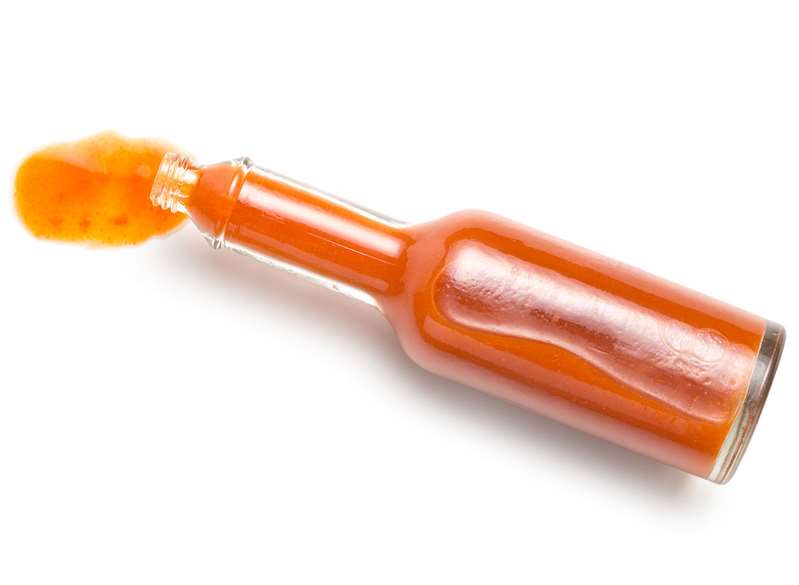If someone asked you what is your favorite condiment, do you know what you would say? For many, hot sauce is likely at the top of the list. Aside from having to pour a glass of milk to cool down your mouth after eating several chicken wings that are drenched in the stuff, do you know what else can happen to your body after eating hot sauce?

Maryann Walsh, MFN, RD, CDE explains why and how three very common reactions occur after you eat something like Sriracha or Harissa. She also gives context as to what problems may arise if you eat too many of these types of spicy sauces. And for more healthy eating tips, be sure to avoid the 100 Unhealthiest Foods on the Planet.
What are some of the things that can happen to your body when you eat hot sauce?
“When we consume hot sauce, a few things happen in the body,” says Walsh.
You think your tongue is on fire: Walsh says that this sensation is attributable to capsaicin, an active component in chili peppers. “When we eat hot sauce, the capsaicin hits the neurotransmitters on our tongue and sends pain signals to the brain,” she says. “The spiciness we experience is only a perception that our tongue is burning when in reality our taste buds are unharmed.” (Related: Exactly What to Do If You Burn Your Tongue, According to a Doctor)
Your core body temperature and heart rate increase: Do you ever feel like your entire body becomes notably warmer after eating something with hot sauce drizzled on it? Walsh says that your core body temperature actually elevates in a process called thermogenesis and contributes to a temporary increase in metabolic rate.
If the hot sauce is spicy enough, you may start to sweat or breathe rapidly. Walsh explains that these are just two ways the body cools itself. “Increased saliva and mucus production may occur too,” she says.
Is there such a thing as eating too much hot sauce?
If you look at the back of a Tabasco bottle, you’ll notice there are only three ingredients: Distilled vinegar, red pepper, and salt. In addition, it has no calories per serving. However, as Walsh points out, it can be very high in sodium, depending on how much you put on your food.
“One teaspoon, not tablespoon, can have up to 90 milligrams of sodium,” she says. “Since the majority of us do not measure hot sauce, it would be pretty easy to surpass the daily sodium recommendation of 2,300 milligrams or less.”
Not only does hot sauce increase your sodium intake for the day, if consumed regularly and in large quantities, it can also be “problematic for individuals with high blood pressure or who regularly experience acid reflux,” says Walsh. (Related: 28 Best and Worst Foods for Acid Reflux)
Instead, she suggests cutting back on hot sauce and instead opting for lower-sodium spices to get that fiery fix. Crushed red pepper flakes are a great alternative, for example. Bottom line, stick to one or two teaspoons of hot sauce daily to keep your sodium levels in check. And for more on the latest food news, sign up for our newsletter.
Are there any positive effects that can occur from eating hot sauce?
Capsaicin, the naturally occurring component in chili peppers, may help people burn an extra 50 calories a day, a meta-analysis containing 90 studies suggests.
“It was also observed that regular consumption significantly reduced abdominal adipose (fat) tissue, reduced appetite, and overall energy intake,” says Walsh. “Though not to be taken as a magic fix, hot sauce can be implemented in the diet to spice up your meals and bump up energy expenditure.”
Just remember not to overdo it on the hot stuff to avoid consuming too much salt for the day. And because hot sauce can make you thirsty, be sure to check out the 7 Side Effects of Not Drinking Enough Water so you know what signs to look out for when your body is dehydrated.





